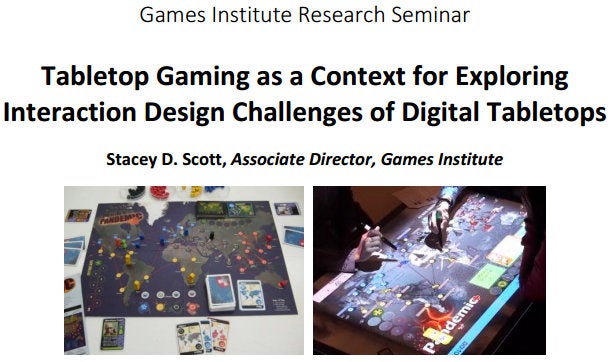Tabletop gaming as a context for exploring interaction design challenges of digital tabletops
Stacey D. Scott, Associate Director, Games Institute
Wednesday,
February
27,
2013- 3:00 pm –
5:00 pm
Davis
Centre
(DC)
1304
(seminar),
reception
to
follow
in
Davis
Centre
(DC)
1301
Digital tabletops provide face-to-face groups an opportunity to interact with and share complex, up-to-date digital information in a manner not previously possible. However, their large display format and horizontal orientation introduce a number of design challenges. Tabletop games, such as card and board games, provide a useful context in which to explore potential interaction design solutions for this computing platform. They can require the use of complex data sets (e.g. historical war games), the use of personal or private data (e.g., competitive strategic card games), or collaboration and information sharing (e.g., cooperative board games). They are also fun and engaging to play with, which addresses a long-standing research challenge when evaluating new design solutions: Study participants are intrinsically motivated to engage in user studies of proposed design solutions and tend to relax and act naturally during studies, even when situated in a laboratory setting. Dr. Scott will present ongoing projects at the University of Waterloo related to interaction design research set in the context of digital tabletop gaming.
Speaker Bio: Dr. Stacey Scott is an Assistant Professor of Systems Design Engineering and English Language and Literature and Associate Director of the Games Institute at the University of Waterloo. She holds a B.Sc. in Computing Science and Mathematics from Dalhousie University (1997), a Ph.D in Computer Science from the University of Calgary (2005), and she completed postdoctoral studies at the Massachusetts Institute of Technology (MIT) (2005-2007). Her research interests primarily focus on the design of digital tabletop systems that support collaboration and socialization in real-world task domains, such as gaming and command and control. In general, her research interests include computer-supported collaboration, large-screen displays, interface and interaction design, and information visualization.